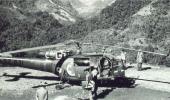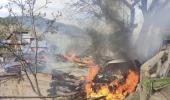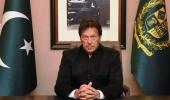India and Pakistan on Thursday announced that they have agreed to strictly observe all agreements on ceasefire along the Line of Control in Jammu and Kashmir and other sectors, even as Indian Army officials asserted there would be no let-up in its fight against terrorism or in its troop deployment along the borders.

A joint statement issued in Islamabad and New Delhi said the Director Generals of Military Operations of the two countries held discussions over the established mechanism of hotline contact and reviewed the situation along the LoC and all other sectors in a "free, frank and cordial" atmosphere.
"In the interest of achieving mutually beneficial and sustainable peace along the borders, the two DGMOs agreed to address each other's core issues and concerns which have propensity to disturb peace and lead to violence.
"Both sides agreed for strict observance of all agreements, understandings and cease firing along the Line of Control and all other sectors with effect from midnight of February 24/25," the joint statement said.
The two sides also reiterated that existing mechanisms of hotline contact and border flag meetings will be utilised to resolve any unforeseen situation or misunderstanding, it added.
When asked about the announcement, the external affairs ministry spokesperson said India desires normal neighbourly ties with Pakistan.
"On relations with Pakistan, as we have said earlier, India desires normal neighbourly relations with Pakistan. We have always maintained we are committed to addressing issues if any in a peaceful and bilateral manner," the spokesperson asserted.
Indian Army officials maintained that there will be no let-up in the troop deployment as well its operations along Pakistan borders against terrorism and infiltration.
The ceasefire, they said, does not mean that the army's fight against terrorism has come to a halt and its alertness and vigil will not be lowered. They said they are "cautiously optimistic" on the ceasefire.
India and Pakistan signed a ceasefire agreement in 2003, but it has hardly been followed in letter and spirit over past several years with more violations than observance of the pact.
The officials said acts of terror in the past have led to "deep distrust" between the two sides.
"There have been contacts between India and Pakistan on a hotline level since 1987. Frequently, the DGMOs of both countries stay in contact through this established mechanism," Pakistani army spokesman Maj Gen Babar Iftikhar was quoted as saying by Dawn newspaper.
He said that from 2014 there was a spike in ceasefire violations along the LoC.
"Both the DGMOs have agreed that the existing 2003 understanding should be implemented in letter and spirit," he said.
Both officials have agreed on making it sustainable and have expressed the intention to act on it, he added, according to the newspaper.
The latest development is seen as a thaw after years of tensions between the two nuclear-armed neighbours, the paper said.
The political parties of Jammu and Kashmir welcomed the agreement with the National Conference hoping that it will be followed in letter and spirit.
"We welcome it and hope that the statement will be followed in letter and spirit. JKNC has always been a strong supporter of the ceasefire along the LoC. This will allow people living along the LoC & IB (International Border) to go about their normal lives with minimal disruption & risk," the NC said.
People's Democratic Party president Mehbooba Mufti in a tweet said dialogue was the only way forward.
"A big and welcome development that India and Pakistan have agreed to a ceasefire along the LoC. Dialogue is the only way forward if both countries want to stop the unending cycle of violence and bloodshed across the borders and J&K," Mehbooba said.
Army chief Gen M M Naravane on Wednesday had hinted at some development on the Pakistan front.
In a webinar, Naravane had exuded confidence that with continued engagement with Pakistan, there could be "some sort of an understanding because unsettled borders and violence on the borders help no one".
"We are always wanting peace and tranquillity in our border areas, whether it be the western front or the northern front and the LAC (Line of Actual Control). Or whether it is on the Indo-Myanmar border, we are always looking for peace and tranquillity and our role is to ensure that so as to the rest of the nation can develop," Naravane said.
In written response to a question in Lok Sabha earlier this month, Union Minister of State for Home G Kishan Reddy said a total of 10,752 cases of ceasefire violations have taken place along India's border with Pakistan in the last three years, in which 72 security personnel and 70 civilians were killed.
He said 364 security personnel and 341 civilians were injured in cross-border firings along the International Border and the Line of Control in Jammu and Kashmir in 2018, 2019 and 2020.
Asserting that the armed forces enjoy freedom on operational deployment, officials said the Indian Army remains committed to fight the scourge of terrorism.
"Acts of terror will not be tolerated and a befitting response would await any misadventure. Our counter infiltration grid continues to be strong. We will continue to undertake counter infiltration and counter terrorist operations. All options remain open to mitigate the threat as deemed by (our) commanders on ground," officials added.
With troops remain deployed along the Line of Actual Control in eastern Ladakh, the officials added that the situation along the northern borders has no bearing on the decisions along the LoC and the western front.
Last week, the armies of India and China which have been engaged in a border standoff in eastern Ladakh completed withdrawal of troops and weapons from north and south banks of Pangong Tso in the high-altitude region.
The disengagement of armies of India and China from north and south banks of Pangong Tso is a "very good end result" and a win-win situation for both the sides, Gen Naravane said on Wednesday but stressed that there is a long way to go and the next steps towards it are de-escalation and de-induction of troops.
He also said there were no signs of an "overt collusion" between China and Pakistan during the Ladakh standoff but India caters to a long-term strategy for not a two, but a two-and-half front war. With the half front, he was referring to the internal security.










